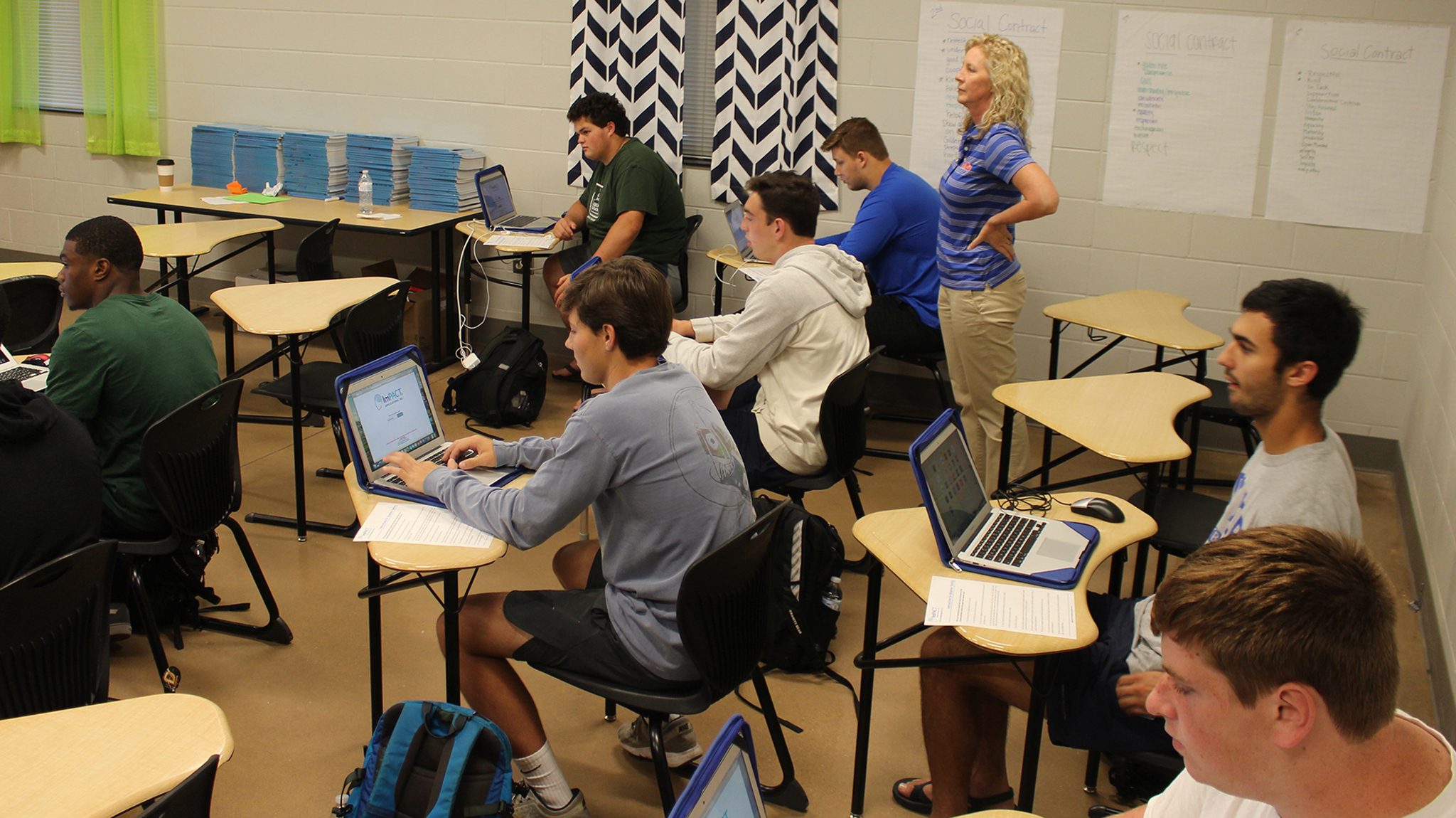
Melinda Valliant, co-director of the UM Center for Health and Sport Performance, oversees baseline concussion testing with Oxford High School football players. Photo by Sarah Sapp/School of Applied Sciences
OXFORD, Miss. – Well known for providing health and wellness research and services to Ole Miss athletes, the University of Mississippi’s Center for Health and Sport Performance is extending its services to the community and settling into its new centralized offices at the South Oxford Center.
With more space and the addition of new staff and more graduate students, the center will offer more testing and consultative services, including concussion testing, to constituents across the region and state.
“The space was much-needed,” said Melinda Valliant, associate professor of nutrition and hospitality management and the co-director of the Center for Health and Sport Performance, or CHSP. “It’s really giving us the opportunity to do things that we were all spread out doing.”
Launched in October 2013, the center is a partnership between the School of Applied Sciences and Department of Intercollegiate Athletics and is co-directed by Valliant and Shannon Singletary, senior associate athletics director for health and sports performance and adjunct clinical instructor in health, exercise science and recreation management.
“I believe that our goal is to help expose the community to a more comprehensive approach to health and sport performance by linking together various aspects in one common place that the individual can go to,” said Heather Landry Shirley, assistant athletics director of sports medicine and adjunct instructor in health, exercise science and recreation management. “The new location will allow us to provide a more neutral and user-friendly environment that will be more easily accessible to the community.”
The center recently was featured in statewide news for helping Rebel football players fuel properly for maximum athletic performance. With more space in its SOC location and expanded staffing, the center is poised to offer more resources to more people.
One of the main projects that the center is working on is studying concussions in high school athletes, combining both research and service learning.
“By law in the state of Mississippi, an appropriate health care provider must approve and order the return to play of an athlete that has had a concussion,” Singletary said. “The center is working to provide objective information to the provider that can be used along with other medical information to allow the professional to return the athlete to competition safely.”
The center is implementing ImPACT Testing to test the effects of concussions on Oxford High School athletes.
“The ImPACT is not a stand-alone diagnostic tool, but rather, it is one piece to the puzzle that allows health care professionals to properly diagnose and manage a concussion or TBI (traumatic brain injury),” Shirley said.
“(When) taken at a time prior to injury, (it) gives the trained clinician a caption of the brain’s normal neurocognitive function and, in turn, can be used for comparison to that of the injured brain, allowing us to determine whether or not the injured individual’s brain has returned to a level of neurocognitive function that is in line with their normal range. A properly trained health care professional can then make a more sound decision in the overall recovery of the individual.”
The center’s staff is collecting baseline data and will work with an analytics team from the Health and Sport Analytics Laboratory, led by Minsoo Kang, professor and chair of health, exercise science and recreation management, Valliant said.
In the future, the center plans to offer different educational courses, different types of testing and nutritional counseling throughout the community.
“We feel that across the country, there is a need for objective information to be given to coaches that will allow more of an evidence-based approach to health and sports performance,” Singletary said. “We will be providing education and best practices to the community that will ensure proper standards are being met, whether it being in sports training programs, proper nutrition or other injury-prevention strategies.”
Students have opportunities to study sports nutrition as an emphasis in master’s and doctoral programs housed in the Department of Nutrition and Hospitality Management.
They also can choose from master’s and doctoral programs in the areas of sport and recreation administration, health promotion, exercise science and health behavior. Enrollees in these programs may apply to conduct research with the CHSP.
For more information about the Center for Health and Sport Performance, contact Valliant at valliant@olemiss.edu or visit the center’s website. Learn more about the academic departments that work with the CHSP at http://www.sas.olemiss.edu.